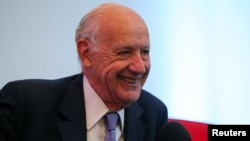In the run-up to Argentina's presidential election this year, a third potential candidate is seeking to stake out the middle ground, tapping into rising discontent among the country's voters amid swirling economic crisis.
Roberto Lavagna, a former economy minister and part of the moderate flank of the Peronist opposition, is positioning himself between President Mauricio Macri's austerity economics and left-leaning former leader Cristina Fernandez de Kirchner.
"We're looking for a future outside the two extremes that have been dominating Argentine politics for the last eight years," he told Reuters and other media on Tuesday.
"That's not Macri's economic tweaks, and not the indiscriminate intervention of the previous government," he said, referring to Fernandez, whose policies included high subsidies and currency controls.
He did not announce or rule out an election run. People close to him politically said he would likely stay quiet until closer to a June deadline for candidates to formally enter the race.
He would be a dark horse candidate, but has been rising lately in opinion polls. Fernandez and Macri currently command around 30 percent support each, while Lavagna polls at a little over 10 percent.
Lavagna is best-known for his stewardship of Argentina's tumultuous economy during 2002 to 2005, when he led a devaluation of the peso currency and the restructuring of Argentina's debt, months after the largest sovereign default in history of nearly $100 billion.
That was followed by a strong revival in growth of over 8 percent annually, memories of which could benefit Lavagna at a time when voters are increasingly worried about the recession-hit economy, rampant inflation and volatile peso currency.
Even opponents agree he is a good man in a crisis.
"He's a moderate, politically in the center, and he's a 'storm pilot'," a former minister who worked with Lavagna and is now in the Fernandez camp told Reuters.
The person, who declined to be named, added that Lavagna's age could count against him, however. Lavagna is 77 and would finish his potential four-year term at the age of 81.
That raises a question as to whether he can appeal to younger voters, in particular.
His policies would include seeking to boost flagging domestic demand and renegotiating the terms of a financing deal Argentina agreed with the International Monetary Fund last year for $56 billion, he said on Tuesday.
Candidates compete in a first round in October, after which if no individual has 45 percent of the vote, or 40 percent and a 10-point lead over second place, a second round run-off is held in November.
Analysts say that if Lavagna could make it to the second round, he would have a better shot than Fernandez of beating Macri.
"If at the end of May, moderate Peronists like Lavagna can reach 30 points of voter support, they will keep rising," Mariel Fornoni, director of consultancy Management & Fit, said. If not, the election will be polarized between Macri and Fernandez."





